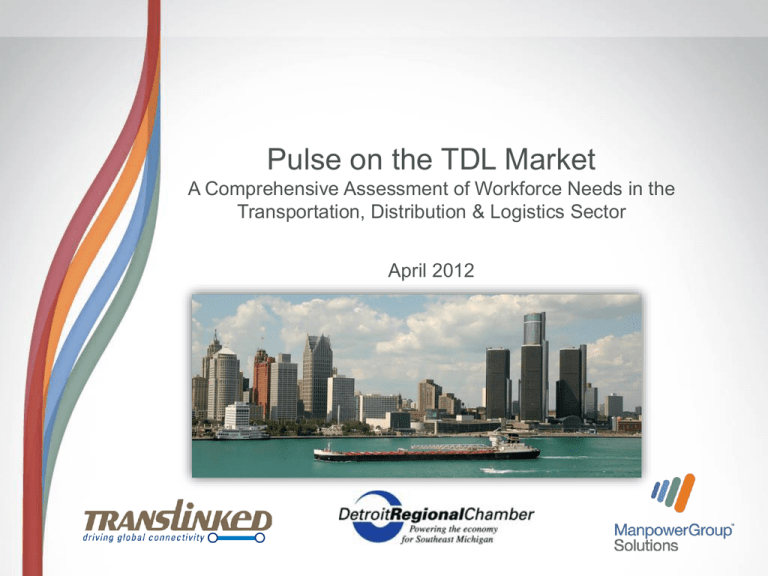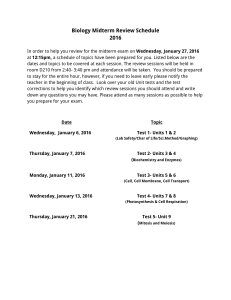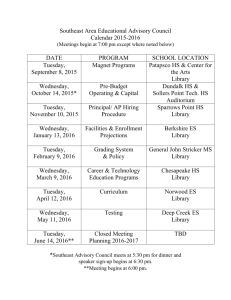FYI - Detroit Regional Chamber
advertisement

Pulse on the TDL Market A Comprehensive Assessment of Workforce Needs in the Transportation, Distribution & Logistics Sector April 2012 TDL Report Agenda • Goals/Purpose of this Report • Participating Companies • Executive Summary • Overall Trends • – Hiring Trends – Recruitment Practices – Skill Sets & Ongoing Development Industry-Specific Trends – Rail – Trucking – Supply Chain/Logistics • Best Practices • Challenges & Recommendations • Appendix ManpowerGroup Solutions | Wednesday, March 23, 2016 2 TDL Report Goals/Purpose of This Report Translinked Six Workstreams • • • 2007: Detroit Regional Chamber embarked on mission to leverage region’s transportation assets for future business attraction 2008: Translinked created to strategically plan region’s future logistics and mobility resources with a focus on developing a world-class and globally recognized transportation and logistics hub. 2012: Manpowergroup Solutions retained to support Workstream 3 of Translinked workstreams: Design a truly regional economic development strategy for the TDL sector – informed by NEI – and conduct the appropriate economic analyses. ManpowerGroup Solutions | Wednesday, March 23, 2016 3 TDL Report Participating Companies ManpowerGroup Solutions | Wednesday, March 23, 2016 4 TDL Report Executive Summary • • Overall sense of “cautious optimism” about the future. Companies focused on challenges with aging workforce: – – • • Attracting the talent to replace the retiring workforce against demographics that can’t support future needs. Capturing and transferring the knowledge from the outgoing workforce. As economy improves, competition for talent will be more difficult than ever, so need for talent pipelines stronger than ever. Greater need to develop key transferable skills (personal, technical, leadership) in order to be successful in a sector that’s constantly changing due to technology, regulations, customer needs, and competition. ManpowerGroup Solutions | Wednesday, March 23, 2016 FYI Top Workforce Issues Facing TDL Companies •Emerging from recession •Aging workforce (impending retirements) •Fierce competition for talent •Lack of pipeline for talent & leaders •Lack of transferable skills (business acumen, communication, leadership) •Retaining talent •Entitlement mentality (pay, promotions, job security) •Legislative changes (Healthcare, safety, etc.) 5 Overall Trends TDL Report Overall Trends 1. Hiring Trends Reported Hiring Trends Last 1-3 Yrs • Overall employment numbers for most companies interviewed have been either flat or slightly decreasing for past 1-3 years. • Most companies are anticipating an increase in hiring of around 1-3% for full-time and contingent positions. • Recovering auto industry cited as helping to drive some of these positive numbers. • Some companies focusing hiring efforts on veterans and spouses of veterans. • Some companies targeting retirees to address knowledge transfer issues (trucking industry in particular has had success in attracting baby boomers). Reported Hiring Trends Next 1-2 Yrs • In some cases, companies have brought back people who were laid off during recession. ManpowerGroup Solutions | Wednesday, March 23, 2016 7 TDL Report Overall Trends 1. Hiring Trends (Cont.) Reasons employees stay with companies & leave companies Top Reasons Employees Give for Leaving Company Top Reasons Employees Give for Staying with Company •Not challenged enough • Feeling valued and respected •Unclear expectations • Financial stability and satisfaction •Want less travel • Good leadership •Higher compensation • Like the team •Not treated fairly • Reputation of company •Lack of leadership • Satisfaction and confidence in role and responsibilities •Personal reasons (life change; career change) • Part of decision-making •Bad manager •Better opportunity •Advancement •Perception that you have to leave to get promoted quicker ManpowerGroup Solutions | Wednesday, March 23, 2016 8 TDL Report Overall Trends 2. Recruitment Practices • Most organizations use internal HR/Recruitment organizations to find talent. • Sourcing channel cited most frequently is career page on a company’s own website (very few use print advertising). • Many focus on internal networking and hiring & promoting from within when possible. Others tapping into local associations for targeted recruiting (e.g. Society of Women Engineers; Black MBAs, etc.) • Some positions rely mostly on relationships with unions in order to find talent (e.g. skilled trades such as carpentry, electrical, drivers, etc). • Some re-evaluating their recruitment practices, training & on-boarding programs to streamline processes and drive towards better efficiencies. ManpowerGroup Solutions | Wednesday, March 23, 2016 9 TDL Report Overall Trends 2. Recruitment Practices (Cont.) • • Many companies focusing on their employer brand in order to differentiate themselves competitively in the marketplace Areas of focus for employment branding include: - Company culture - Innovation - Flexibility & empowerment - Stable environment/company - Ability to grow - Pay/benefits - Part of decision-making - Strong management & leadership FYI Benefits of Having a Strong Employer Brand • Higher quality candidate pool • More candidates who match role requirements and relate to the organization's culture • increased attraction and closing of passive candidates • Decreased application-to-hire ratio • Lower rate of offer rejection • Decreased time-to-fill and costper-hire ratios • Lower turnover • More employee referrals • higher levels of employee engagement • Increased productivity ManpowerGroup Solutions | Wednesday, March 23, 2016 10 TDL Report Overall Trends 2. Recruitment Practices (Cont.) • • • Most companies have active college recruiting strategies which include campus visits, guest lectures, mentoring programs, presence at job fairs, networking events & apprentice programs. Senior leaders in some organizations have aligned themselves with specific schools in order to foster deeper relationships. Success Story: Central Michigan provides part-time and summer jobs and internships for students enrolled in Transportation & Logistics programs. Companies cite that graduates from these programs come into the job market with stronger skills around flexibility, negotiation and the ability to make sound business decisions. ManpowerGroup Solutions | Wednesday, March 23, 2016 FYI Top Michigan Colleges/Universities Cited for Recruiting Talent •Central Michigan •Michigan State •Univ of Michigan •Michigan Tech •Wayne State Univ •Ferris State Univ •Eastern Michigan Univ •Northern Michigan Univ •Michigan Institute of Aviation & Technology •Michigan Technological Univ 11 TDL Report Overall Trends 2. Recruitment Practices (Cont.) • • Although the primary channel for college recruits comes from in-state colleges and universities, many companies actively recruit from campuses outside of Michigan. Some of the main reasons cited for recruiting out-of-state were: - - - Maintain an active pipeline of future candidates Want to bring in more diversity Not enough qualified candidates coming from in-state schools In-state schools don’t offer enough needed programs (e.g. vehicle maintenance & management programs) Helps to address mobility issues(out of state recruits tend to be more comfortable relocating & traveling) Want to find best nationwide talent and bring it to Michigan ManpowerGroup Solutions | Wednesday, March 23, 2016 FYI Top Out-of-State Colleges/Universities Cited for Recruiting Talent •Miami Univ (Ohio) •Purdue •Penn State •University of Florida •Clark Atlanta Univ •Duke Univ •Cornell •Univ of Illinois •Univ of Wisconsin •Georgia Institute of Technology 12 TDL Report Overall Trends 3. Skill Development • Transferable skills needed for success across TDL sector: - Technical Skills: Essential to a particular industry/function - Personal Skills: Essential for any role (a.k.a. soft skills) - Leadership Skills: Essential for inspiring & motivating others and for building organizational capability • Most companies have internal development and incentive programs to attract, retain and develop their employees such as: - New hire training/on-boarding - Management/leadership training programs - Tuition reimbursement - Mentor programs - Internships - On-the-job training - Career path ladders - Mandated training (hazardous cargo, compliance, safety, TSA, etc.) ManpowerGroup Solutions | Wednesday, March 23, 2016 13 TDL Report Overall Trends 3. Skill Development (Cont.) • • Blending of disciplines is becoming more common (e.g. mechanical, electrical, hydraulic), making it necessary for more specialization and crosstraining of skills. Many companies report having difficulty finding candidates who are both qualified to do the work and who want to do the work. Reasons candidates don’t want the job include: - Mobility(don’t want to relocate or travel) - Think they should be at a higher level (don’t want to pay their dues) - Compensation issues - Don’t see career path/advancement opportunities - Don’t think they’ll be challenged enough - Don’t like shift ManpowerGroup Solutions | Wednesday, March 23, 2016 FYI Top 5 Difficult to Find Positions 1. Engineers (Mechanical, Technical, PowerTrain, Project, Electrical, Logistics) 2. Sales & Business Development 3. Experienced Drivers (heavy/tractor trailer, forklift) 4. Skilled Trades (mechanics, manufacturing, welders) 5. Niche Technologies (Supply Chain, IT, Hybrid, Mobile Applications) 14 TDL Report Overall Trends 3. Skill Development (Cont.) Engineering positions particularly difficult to fill and retain for many organizations due to a variety of reasons: • Unrealistic expectations: Guidance counselors often over-selling job. • Lack of well-rounded experience: Lacking other skills needed to succeed (e.g. business acumen, understanding P&L, budgeting, communication, collaboration, innovative thinking, etc.) • Mobility issues: Not willing to relocate or travel. • No set career path: Perception that you have to move to another company to advance in career. ManpowerGroup Solutions | Wednesday, March 23, 2016 15 Industry Specific Trends TDL Report Industry Specific Trends 1. Rail The Freight Railroad Administration (FRA) has identified six industry challenges that have been included in USDOT Framework for a National Transportation Workforce Strategy: • Aging railroad workforce – highlighting need for knowledge transfer. • Workforce diversity – shortages of women and minorities in the rail workforce. • Overall image of the rail industry – declining and stagnant technologically. • Need for national training standards – for freight rail craft and trade positions. • Work-life balance issues – attrition among employees with less than five years of service. • Availability of suitable metrics – to constantly monitor the collective railroad workforce. ManpowerGroup Solutions | Wednesday, March 23, 2016 17 TDL Report Industry Specific Trends 1. Rail (Cont.) • • • • As more technology makes its way into railroad operations, more cross-disciplinary workers will be needed to handle advanced machinery and equipment as well as safely operate the rail yard. FYI • There are approximately 3,689 freight rail workers in Michigan • 80% of all rail workers are unionized Train engineers will have to be trained on the use of new positive train control (PTC) technologies and mechanics will have to be adept at maintaining such systems. • The average age of a rail worker is 48 The future rail yard worker will need to have enhanced computer oriented skills as well as knowledge of other advanced technologies coupled with knowledge in their domain area to be successful. • Conductor training costs about $20,000 and lasts 12-15 weeks Some companies have found success by hiring from the ex-military pool as potential employees because they are familiar with the vital importance of safety rules and operating on a 24/7 schedule. ManpowerGroup Solutions | Wednesday, March 23, 2016 • Average wages & benefits per rail worker is $97,240 • The railroad industry is running a public relations campaign called “Freight Rail Works” to highlight rail’s clean and green qualities 18 TDL Report Industry Specific Trends 2. Trucking • Despite a high U.S. unemployment rate of 8.3%, truck drivers are still in short supply. • Trucking-labor costs declined during the recession, so some of the projected wage increases will be “catch-up.” Increased wages for employees will most likely result in increased prices for customers according to the National Industrial Transportation League. • U.S. trucking companies may face a 30% surge in wage bills by 2014 as rising demand for freight shipments threatens to push industry’s driver shortage to the longest on record. • Trucking companies with too-few drivers and strong demand can be more selective in giving priority to the most-lucrative, easy-to-haul cargo. FYI Top Issues Facing Trucking Industry • The economy • Rise in wages • Hours of Service (HOS) changes • Driver shortage • Compliance Safety Accountability (CSA) • Fuel costs ManpowerGroup Solutions | Wednesday, March 23, 2016 19 TDL Report Industry Specific Trends 2. Trucking (Cont.) • • • Training for truck drivers generally provided by private training schools. Courses are typically 4-6 weeks long and cost several thousand dollars. Some gaps from truck driving schools, especially around new technologies (e.g. DataColumns, RF scans, etc.) Pennsylvania, Texas, and Oklahoma offer state funded programs to address shortage of drivers. The state provides certification and hires graduates for short-term assignments to provide needed experience. • Many companies require drivers with a minimum of two years materials hauling experience before being hired, citing safety as the main reason. • Many drivers out of school find jobs with companies that deliver goods nationwide. They gain their two years of experience on the road, then often return to find a job that keeps them more local. ManpowerGroup Solutions | Wednesday, March 23, 2016 FYI • There are approximately 45,660 Heavy and Tractor-Trailer Truck Drivers in Michigan • There will be a national shortfall of approximately 300,000 full-time trucking positions by 2013 (10% of the workforce) • Fleet operators spend around $5,000 to $8,000 to recruit and train a new driver 20 TDL Report Industry Specific Trends 3. Supply Chain/Logistics • Previously discrete sectors of warehousing, freight forwarding and logistics consulting & planning are converging at a rapid pace with the rising importance of holistic supply chain management. • Soft skills and cross cultural skills becoming increasingly important as supply chains become more global. • Cross functional skills also gaining importance. Supply chain professionals need to understand specific market category – as well as the supply chain process associated with making, shipping, and selling that category. • Candidates often have depth in one area and not the other. Some companies are using rotational programs to increase employees’ knowledge and depth. ManpowerGroup Solutions | Wednesday, March 23, 2016 21 Best Practices TDL Report Best Practices Innovation LEAPS Program Partnership for Advanced Studies Description • Summer internship program that selects 25-30 of the best college students from around the country. • Program provides real-life construction experience where students learn about different building types and delivery methods while gaining on-the-job experience. • 95% of graduating interns are hired by their sponsoring company. • Program that mobilizes educators, employers, and community leaders in company’s Nashville, TN location to create a new generation of young people who will graduate from high school college- and career-ready. • Program consists of transforming learning initiatives centered around three strands: 1) Teaching and Learning; 2) Redesigning High Schools and 3) Sustaining Change Through Business and Civic Leadership. ManpowerGroup Solutions | Wednesday, March 23, 2016 23 TDL Report Best Practices (Cont.) Innovation Junior Development Group Description • Group of high potential employees selected to become a cohort group that gets to participate in various strategic decisions that affect the company. • Designed to instill a sense of ownership and build skills around critical thinking, innovation, business planning, and problem solving. • Group meets with Sr Leadership once a month to focus on different area. • Program has been well received and has resulted in high retention rates and promotions among members. College Partnerships Several companies reported strong relationships with colleges & Universities that shared some similar success factors: •Sr leader assigned to a particular school/college dean •Participation and influence in school curriculum (guest lectures) •Discussion of employment needs and opportunities •Sponsoring networking events, internships, town hall meetings •Building a pipeline of future hires ManpowerGroup Solutions | Wednesday, March 23, 2016 24 Challenges & Recommendations TDL Report Challenges & Recommendations How Do We Dream Big and Get More Lift? Focus on five key areas: 1. 2. 3. 4. 5. School counselors Perception of TDL industry K-12 educational system Post-secondary educational system Finding talent ManpowerGroup Solutions | Wednesday, March 23, 2016 26 TDL Report Challenges & Recommendations Category School Counselors Description • College career counselors, high school counselors and job placement organizations are influential intermediaries who don’t have enough current information about TDL career choices. • Steering students towards either college or other career choices outside the TDL sector. • Set unrealistic expectations by overselling positions • Don’t have enough current real world business experience. ManpowerGroup Solutions | Wednesday, March 23, 2016 Recommendation • Active outreach to career counselors at the high school and college levels to educate on various industries and sub-sets of industries in TDL. • Help job seekers make informed choices about TDL career options; offer vocational careers as a viable alternative to obtaining a college degree. • Discuss realities and possibilities of job (don’t over- or under-sell a job). • Invite counselors to job site so they can see first-hand what the job/sector is really about. 27 TDL Report Challenges & Recommendations (Cont.) Category Perception of TDL Industry Description • Most individuals not currently working in TDL industry do not have a strong opinion about the industry, but where they do hold opinions, they were generally negative. • TDL industry not always perceived as a technology-intensive industry. • TDL jobs sometimes perceived as: - Unexciting and repetitive, demanding long hours and hard physical labor - Underpaid and lacking in benefits - Jobs you take while you look for a career somewhere else ManpowerGroup Solutions | Wednesday, March 23, 2016 Recommendation • Create regional campaign highlighting the TDL sector; position Southeast Michigan as a destination for high tech, high paying jobs. • Community leaders need to emphasize vocational careers more in order to remove perceived negative stigma. • Offer more internships and “a day in the life of…” programs starting at the elementary and high school levels. 28 TDL Report Challenges & Recommendations (Cont.) Category K-12 Educational System Description Recommendation • Companies consistently cited a lack of vocational training at the high school level to better identify and prepare candidates for jobs; not enough appreciation of craft. • More efforts to spark interest in kids at an early age (K-12) around such things as innovation, critical thinking, problem solving, etc. • Also cited consistently was a lack of foundational skills in math, science and technology that should begin and be developed at a young age. • Begin building pipeline of future workers at an earlier stage; keep them involved throughout their education. • Reinvigorate vocational programs; remove perception that everyone must go to college. • More partnerships between the business community and schools (e.g. “Software Engineering Academy” in New York City sponsored by Mayor Bloomberg and IT business leaders). ManpowerGroup Solutions | Wednesday, March 23, 2016 29 TDL Report Challenges & Recommendations (Cont.) Category PostSecondary Educational System Description • Graduates from colleges, universities and technical schools lack many of the transferable skills needed for success in any job (e.g. business acumen, leadership, problem solving, etc.) • Not enough specialized programs for niche or converging industries. ManpowerGroup Solutions | Wednesday, March 23, 2016 Recommendation • Need more partnerships with technical schools to cultivate pipeline and close skill gap. Technical curriculum should also include transferable skills around leadership, problem solving, business acumen, etc. • Need to offer additional specialized programs at the national & state levels. For example, there is no current U.S. program for Freight Forwarding (only for Supply Chain). Australia, Germany, France and Switzerland all offer Freight Forwarding programs with apprenticeships. 30 TDL Report Challenges & Recommendations (Cont.) Category Description • Lack of unified plan to address talent shortage at a regional level. • Look more holistically at all factors that go into finding talent (transferable skills, technical skills, demographics, commute times, quality of life in communities, etc.) to build local and regional TDL sourcing & recruiting strategies. • Some local business, community and political leaders cited as being too focused on looking for talent within Michigan and trying to keeping the talent here once they graduate. • See benefit in mobility into and out of the state (helping to produce more well-rounded people who may come back to Michigan with greater skillsets. • Increased competition for talent with shrinking demographics to meet future needs. Finding Talent Recommendation • Elevate skillset of entire region by offering incentives for employees to gain broader experience (abroad or in other states) then come back home to apply skills and knowledge locally. ManpowerGroup Solutions | Wednesday, March 23, 2016 31 Appendix TDL Report Projected Growth in TDL Jobs 2012 - 2014 Combined Industry Market View Top TDL Industry Groups – • • • • • Detroit-Warren-Livonia, MI Ann Arbor, MI Flint, MI Lansing-East Lansing, MI Toledo, OH Source: EMSI employment data from Quarterly Census of Employment and Wages (QCEW) produced by the Department of Labor with total employment data in Regional Economic Information System (REIS) published by the Bureau of Economic Analysis (BEA), augmented with County Business Patterns (CBP) and Non-employer Statistics (NES) published by the U.S. CensusManpowerGroup Bureau. Projections are based on the latest available EMSI industry data, 15-year past local trends in each industry, Solutions | Wednesday, March 23, 2016 growth rates in statewide and (where available) sub-state area industry projections published by individual state agencies, and (in part) growth rates in national projections from the Bureau of Labor Statistics. 33 TDL Report ManpowerGroup Solutions | Wednesday, March 23, 2016 34




